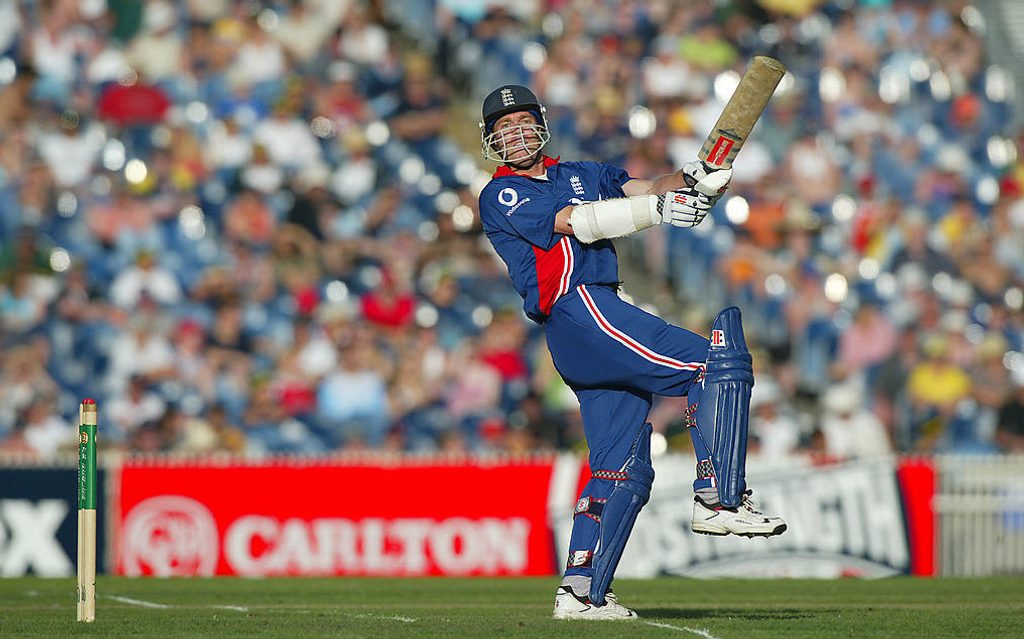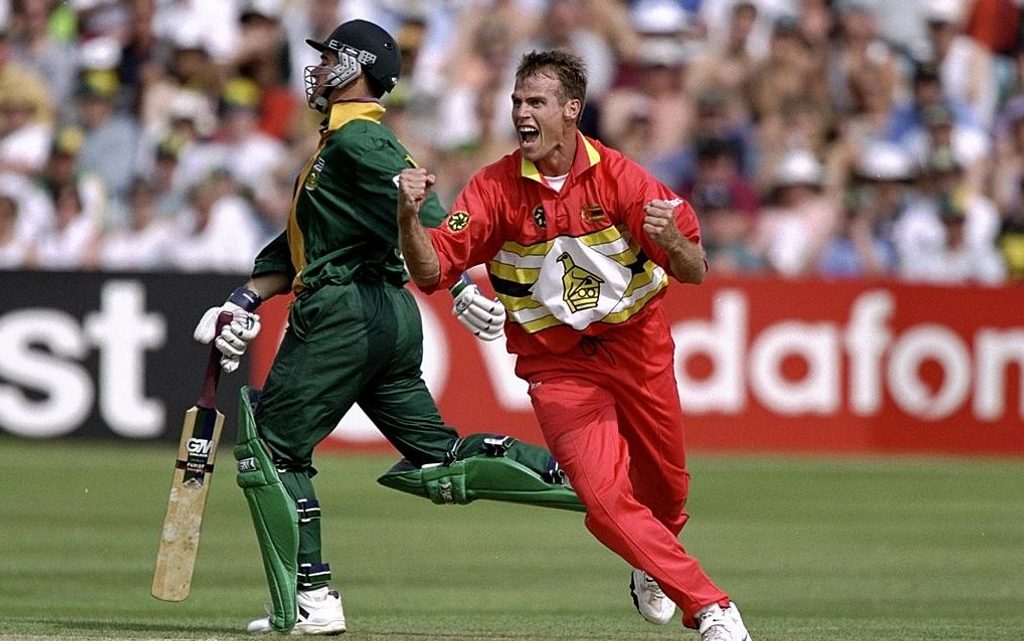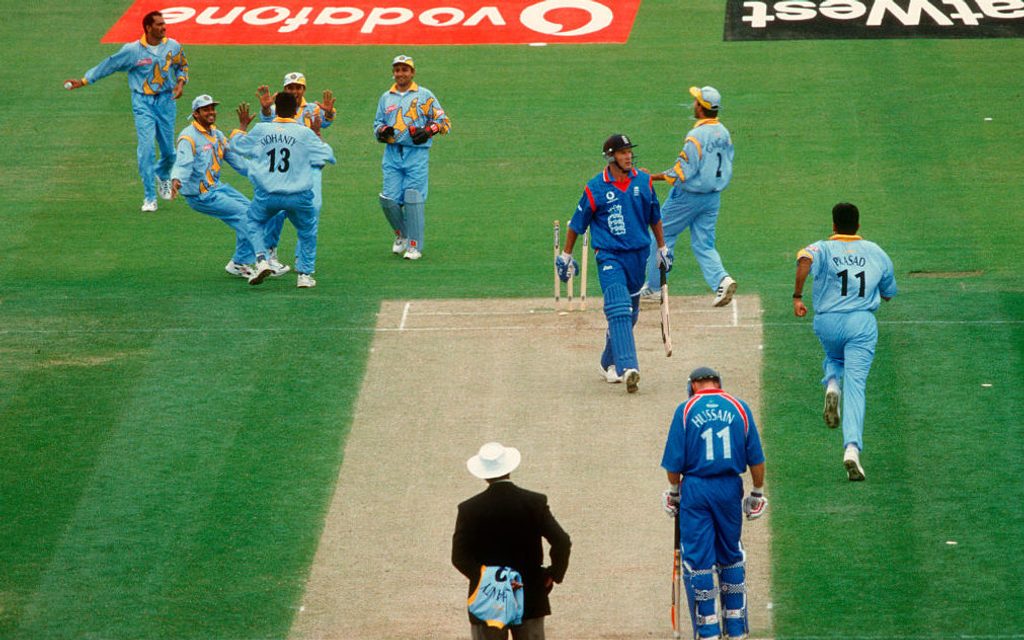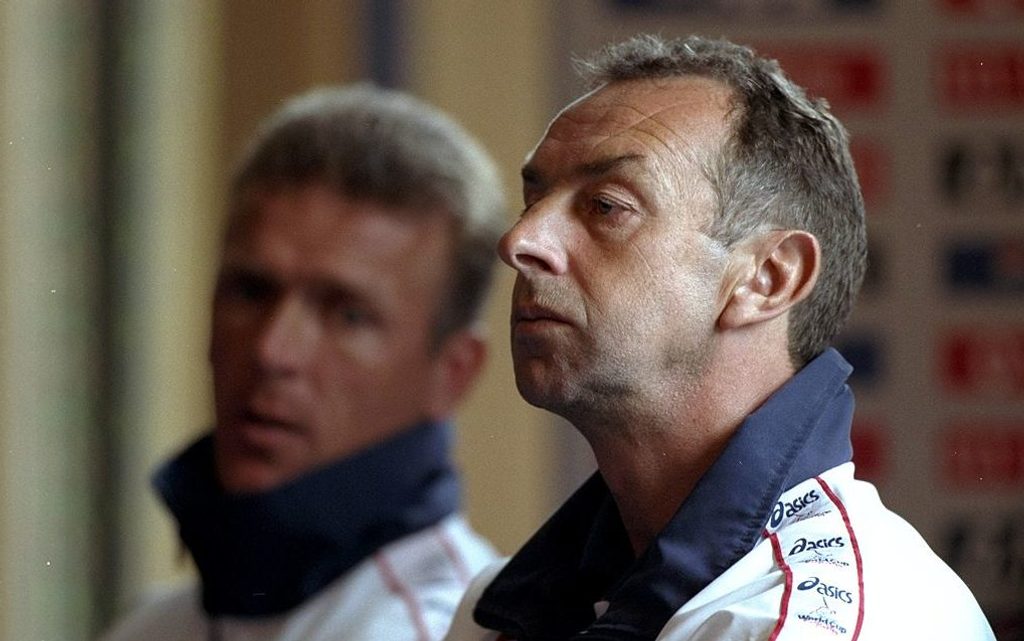
Fans were promised a ‘carnival of cricket’ when the World Cup returned to English shores for the first time in 16 years. The reality for the hosts was rather different. First published in issue 20 of Wisden Cricket Monthly, Jo Harman looks back at how England’s miserable 1999 Cricket World Cup campaign unfolded.
England were not considered among the favourites heading into the 1999 World Cup. Ropey form, a late change of captain – with Alec Stewart replacing Adam Hollioake only a few months out from the tournament – and a pay dispute between the players and the board threatened to undermine their campaign before it had got off the ground. However, with home conditions in their favour, there was an expectation they could still go far in the tournament.
[breakout id=”2″][/breakout]
Alec Stewart (England captain): Realistically we weren’t the best side going into it but we had that belief that if we played like we could, then we’d be there or thereabouts.
Adam Hollioake (England all-rounder): We definitely felt we had a better chance of winning it in those conditions but there wasn’t a great feeling in the team. I’m not blaming Stewie [Alec Stewart] or Bumble [David Lloyd], fundamentally they did a good job. I just think the players didn’t click. They didn’t gel.
Already frustrated by scheduling which meant they were forced to travel to Sharjah for a tri-series only a month before playing the World Cup in vastly different conditions, Lloyd and Stewart then had their request to include Leicestershire’s Chris Lewis in the squad rejected.
David Lloyd (England coach): We canvassed opening batsmen around the country, asking who’s the most difficult to play against the new ball. Two names kept cropping up: Ian Austin and Chris Lewis. Stewie and I made a good case why we wanted Chris but it was a step too far for David Graveney and the selectors. Lewis had had a couple of issues with turning up late and one thing or another and they’d had enough of him. But he was a bloody good cricketer.
Stewart: Chris was a recognised international cricketer who we knew could bat, bowl and field at that level. He was a game-changer. Whereas others in the squad were horses for courses cricketers in England.
Hollioake: I’d had the same gripe in the lead-up to the one- day series against South Africa in 1998. I was a big Chris Lewis fan, a lot of people were. I guess as a selector you’ve got to balance up how disruptive a player is but any good captain or coach would say, ‘I’ll back myself to manage him, I just want my best players’.
Further grievance was to follow as England’s request to the ECB to train at Grace Road, Leicester, was turned down.
Lloyd: I was asked, ‘Where do you want to go?’ I said Leicester, because at that time they had the best facilities. I was hopping mad when we got turned down. Why ask me in the first place?
Stewart: We were told in no uncertain terms that they had to be neutral and we were sent down to Canterbury. Are they looking after the opposition more than they look after us? At that time it was very much what the players felt.
[breakout id=”4″][/breakout]
On the eve of England’s first match, against reigning champions Sri Lanka at Lord’s, the decision was made to drop Nick Knight, a mainstay at the top of the order for the last three years, in favour of Nasser Hussain.
Stewart: It was a decision made the afternoon before the opening game, which is wrong. We’d been inconsistent and Knighty had been inconsistent but if we had our time again Knighty would have played and Nasser wouldn’t have done. Nasser says he was shocked but he’d been badgering everyone to play, so don’t worry about that. He was fine. The tough one was telling Knighty.
Hollioake: Nasser coming into the side stands out in my mind as being a mistake. He was a wonderful Test player and he brought the power of the England team back to the captain, which was a great thing, but he just wasn’t a one-day player. He wasn’t in my top 50 one-day players in England. I’m not the judge of who’s good and who’s not but I think a lot of people probably felt similarly to me. We had a pretty stable side leading into the World Cup and literally on the eve of the tournament we panicked and changed it.
[caption id=”attachment_107144″ align=”alignnone” width=”800″] Despite being a regular at the top of the order, Knight was dropped before England’s first match of the tournament[/caption]
Despite being a regular at the top of the order, Knight was dropped before England’s first match of the tournament[/caption]
Lloyd: It was tough on Nick Knight, but you’ve got to make tough decisions. Nick’s a good friend and there’s not a week that goes by that he doesn’t remind me of that. Any opportunity, especially if Hussain’s in the room!
Writing for Wisden, Matthew Engel reported the opening ceremony, played out in mid-May drizzle, to be “quite pathetic… letting off a few cheap-looking fireworks and forcing several poor schoolgirls to stand around in the cold”. Lloyd recalls it was a damp squib. “The fireworks didn’t actually firework.”
Nonetheless, after that less than inspiring start England swept aside Sri Lanka by eight wickets, chasing down 205 with three overs to spare, with Stewart (88) and Graeme Hick (73*) in the runs and Alan Mullally picking up four wickets. Four days later they took on Kenya at Canterbury, with the off-spinner Robert Croft selected in place of an out-of-sorts Hollioake.
[breakout id=”0″][/breakout]
Hollioake: I was struggling with the white Dukes ball. I joke with people that it ended my career. It swung all over the shop and I struggled to control it. I held it across the seam for most of that World Cup, trying not to bowl wides, and it was a very hard ball so my slower ball was hard to deliver with it. And then when I batted everyone else seemed to master the fact it was swinging all over the place and I just got out.
England again won comprehensively, by nine wickets, but Hussain (88* off 127) and Hick (61* off 89), came in for criticism for scoring too slowly – something that would come back to haunt the team later in the tournament.
Stewart: In hindsight, if we’d been more sharp and alert as a group, we should have won about five or six overs earlier. From memory it wasn’t, ‘We’ll win this and win it well’. It was just, ‘Go and win it’.
Lloyd: Run rate wouldn’t have had much of a bearing at that stage. Just win the game. But you’d expect them to win as quickly as possible. Sometimes lads might just think, ‘I need a bit of practice here’.
Hollioake: I remember in the very first team meeting pointing out that we had to be very conscious of run rate. I felt it was important we discuss it. I was told at the time just to concentrate on winning games.
The day after England’s win over Kenya, Zimbabwe sprung a surprise by defeating India by three runs at Grace Road – a result that would have significant ramifications – but with two wins from two, the hosts were sitting pretty at the top of Group A. Then the wheels came off against South Africa at The Oval, with England succumbing to a 122-run defeat. Allan Donald was their chief destroyer, taking 4-17.
Lloyd: We had a shocking day. Our batsmen couldn’t handle their attack.
Stewart: We came third. But that’s how we were in the late 90s, early 00s. I won’t say hot or cold, we were warm or cold. We had it in us to beat anyone but at the same time we had it in us to play poorly.
Hollioake: South Africa were the best side in that tournament, comfortably. Better than Australia who eventually won it. They’d been dominating everybody and they had everything. In hindsight they’ll feel they should have won that World Cup.
England’s batting frailties had been exposed but they bounced back three days later against Zimbabwe at Trent Bridge, Graham Thorpe’s half-century scripting a seven-wicket win. Again though, their run rate was causing concern, with the hosts taking 39 overs to chase down 168.
[breakout id=”1″][/breakout]
Hollioake: I remember going up to Bumble against Zimbabwe and saying I’d go out and give it a whack. But it was, ‘No, let’s get the job done’. One problem was our run rate was no good, but also the guys at Nos.5, 6, 7, 8 weren’t getting a hit. When we went into our final game against India I hadn’t batted at the World Cup. Our cricket was probably good enough to get us through to at least the semi-finals but I would say our hustle and street smarts were a million miles behind. I’m not just talking about the captain and coach. We were really just quite naïve. We were like a young deer prancing around on the Serengeti in front of a pride of lions.
Lloyd: At that stage – played four, won three – that was a great position to be in. There was a confidence around the team: people coming into form, bowlers doing their job.
England’s progress to the Super Six stage looked all but assured, to the extent that some newspapers mistakenly reported they had already qualified. Only defeat to India at Edgbaston in England’s final match, a shock Zimbabwean victory over tournament favourites South Africa – who had won four from four and already qualified – and a significant swing in net run rate would prevent their qualification.
[caption id=”attachment_107141″ align=”alignnone” width=”1018″] Neil Johnson scored 76 and took three wickets in Zimbabwe’s surprise win over South Africa[/caption]
Neil Johnson scored 76 and took three wickets in Zimbabwe’s surprise win over South Africa[/caption]
Hollioake: It felt like a home game for India. I remember Tendulkar and Ganguly coming out to bat and I was like, ‘Far out, are we in Birmingham or Bombay?’ It was full on. There were so many Indian fans there.
England restricted India to 232-8, Mark Ealham taking 2-28 and accounting for Tendulkar and Azharuddin with his wobbling seamers, but events at Chelmsford were causing a few jitters. Zimbabwe had posted 233-6 – a total which South Africa should really chase down, but enough to cause some concern among home supporters.
England had reached 73-3 in reply when rain swept through Edgbaston and forced the match into the reserve day. The players then watched on in horror from the changing room as South Africa collapsed to 185 all out, putting Zimbabwe level on six points with England. The match would later be investigated by Delhi police in connection with the Hansie Cronje match-fixing saga and while no evidence was found to suggest foul play, England had their suspicions.
Lloyd: To say I was surprised is an understatement. My understanding is that at least one game in our group was investigated.
Hollioake: I remember us sitting in the changing room and I think we were actually saying, ‘That’s fixed, that’s fixed’. That seems a fair enough explanation now but don’t forget that back then nobody had been done for match fixing. It was not even discussed. If someone had thrown a game, we thought it was from the perspective of trying to knock us out. I think it was only a year later that the Hansie Cronje stuff came out and that was our first insight into it really.
England resumed their innings the following day needing 160 from 29 overs to avoid being dumped out of their own competition at the first opportunity. They crumbled under the pressure, Sourav Ganguly taking 3-27 with his part-time seamers as the hosts were bundled out for 169. Again, the England camp suspected all was not as it seemed, particularly with the early lbw dismissal of Thorpe which precipitated the collapse.
[caption id=”attachment_107137″ align=”alignnone” width=”1011″] Graeme Hick departs first ball against India[/caption]
Graeme Hick departs first ball against India[/caption]
Lloyd: It’s a bit of sour grapes when you say you got bad umpiring, but we did. We were going absolutely fine and [Javagal] Srinath from round the wicket got Graham Thorpe lbw. It wouldn’t have hit another set. There were decisions that were questionable.
Stewart: Some umpiring decisions went against us. Thorpey got a shocking lbw decision. It hasn’t been proved but the word on the street is that they may have made sure certain players were given out. There’s no proof to that but there have been strong rumours ever since. But we didn’t win the game, so there’s no point looking at the darker side of that.
Hollioake: One minute we were cruising along and then it was like, ‘We’re going out here’.
Sixteen days after the tournament had begun, and with three weeks still to play, the hosts were out. England’s players packed their bags and returned to their counties. “No debrief,” recalls Stewart. “There are honourable defeats, unfortunate defeats and then ignominious defeats,” reported The Times. “The manner by which England’s interest in the World Cup ended yesterday rests, unfortunately, in the final category.”
Insult was added to injury when the official World Cup song – All Over The World by Dave Stewart of Eurythmics – was released the day after England left the competition. London’s two biggest stores reported zero sales 24 hours later.
Hollioake: There was a World Cup song? I didn’t even know that.
Lloyd: That’s something that’s passed me by. I didn’t know anything about a World Cup song. News to me.
England’s early exit marked a changing of the guard, with Lloyd leaving his post as coach to take up a commentary job with Sky and Stewart sacked as captain. For Hollioake, who only six months previously had been preparing to captain his country in a home World Cup, it was the end of his international career, at the age of 28.
[caption id=”attachment_107140″ align=”alignnone” width=”1018″] Stewart (left) and Lloyd (right) both left their posts as captain and coach respectively[/caption]
Stewart (left) and Lloyd (right) both left their posts as captain and coach respectively[/caption]
Stewart: It was a bad year. The Test series defeat to New Zealand [later that summer, which made England officially the worst Test team in the world] was the bottom, but not qualifying in our own World Cup was a big let-down for everyone. Then Duncan [Fletcher, who took over as coach in late 1999] and Nasser [who replaced Stewart as captain] started to take the team forward.
Lloyd: I’d say that World Cup in England was the end of an era of stale cricket in this country. From a board point of view I can sympathise with them, because there wasn’t the money in the game to do it justice. After the broadcast deals we started to get savvy: academies, Lions tours, umpires being paid properly, coach education, central contracts.
Hollioake: My energy and thoughts were focused on that World Cup. Building towards it. All my training, my visualising… when I went to sleep at night I was thinking about that home World Cup. As a kid you imagine playing for England and think this is going to be the best time of your life, playing with your best mates. Then the weather was miserable, the ball was horrible, the pitches were doing all sorts, our team didn’t really like each other, we played terribly. It was over before it got going. It was one of those moments in my career where I was like, ‘Well, that was shit’.
[breakout id=”3″][/breakout]







